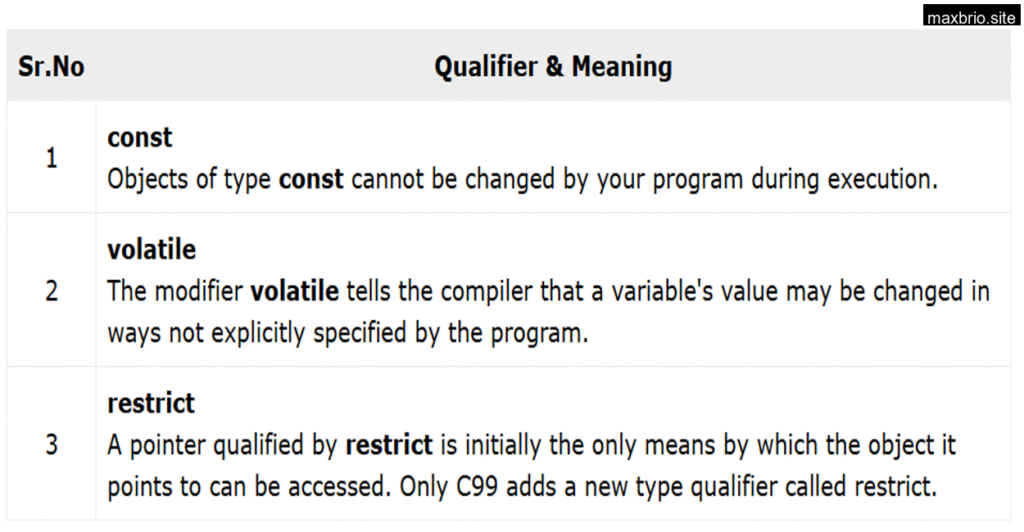I still remember the day i taught about variable modifiers in class. It was one of those days where the ceiling fans in the lab were louder than the students. The monsoon outside had cooled the city, but inside, the air was thick with concentration and confusion. Amaan, a soft spoken but inquisitive student, had been staring at his screen for fifteen minutes, brow furrowed like he was trying to decode ancient Sanskrit. Finally, he raised his hand and said:
“Sir, why is my variable not updating… even though I know it is?”
I walked over. His code was simple enough a loop, a flag variable, some hardware I/O simulation from a library. Everything looked fine. But it wasn’t behaving. That’s when I smiled and asked, “Amaan, have you ever heard of volatile?” He blinked. “Isn’t that… like a moody variable or something?” And just like that, we entered the world of variable modifiers those little keywords that feel optional until they’re absolutely not.
What Are Variable Modifiers in C?
I like to explain it to students this way: Imagine you’re managing a storage room. Some boxes are locked (const), some are marked “fragile, handle carefully” (volatile), some take up only half the space because they’re short lived (register), and some need special handling instructions like “don’t optimize me away.”

Modifiers are instructions you give to the compiler about how a variable should behave. Without them, every variable is just… a box. With them, we’re giving the compiler hints that can change everything from speed to correctness.
1. const: The Do Not Disturb Tag
This one’s the easiest to explain.
const int max = 100;
I tell my students: once you slap const on a variable, it’s like putting it under glass in a museum. You can look at it, you can use its value, but if you try to change it boom. Compilation error.
I once had a student ask, “Then why not just use #define?” A beautiful question. I explained that while #define is a preprocessor directive, const is type safe, scoped, and debuggable. You get more control and fewer surprises.
2. volatile: The Variable with a Life of Its Own
Back to Amaan’s problem. His flag variable was being changed outside the flow of the main code probably by a hardware interrupt or external input. But the compiler didn’t know that. It assumed the value wouldn’t change (because why would it?), and optimized it away.
volatile int flag;
Once we added volatile, everything worked.
I turned to the class and said, “Imagine a vending machine that occasionally restocks itself when you’re not looking. If you assume the contents never change, you’ll never get that fresh Snickers. volatile tells the compiler: ‘Hey, I know you think you’re smart, but trust me this can change without you knowing.’”
3. register: The Speed Demon’s Wish
This one always makes students excited and then slightly disappointed.
register int counter;
Back in the old days, this told the compiler, “Put this in a CPU register, please, for super speed.” But modern compilers are already smarter than we are. So it’s more of a polite suggestion now than a command.
Still, I told them, “It’s like asking a librarian to keep your favorite book right on the desk. They might do it. Or not.”
I also warned them: “No taking the address of a register variable. That’s like asking for the home address of a passing stranger.”
4. static: The Elephant in the Local Room
One day, a student named Nidhi asked, “Sir, why does this counter reset every time I call the function?”
Ah, the perfect entry point for static.
void fun() {
static int count = 0;
count++;
printf(“%d\n”, count);
}
I ran the function thrice. The output was: 1 2 3.
I removed static. Ran it again. 1 1 1.
The class looked stunned.
I told them, “A static variable inside a function remembers its value between calls. It’s like a local variable with global memory loyal, persistent, and quietly powerful.”
The Real Lesson
Teaching modifiers isn’t about dumping definitions. It’s about stories.
I talked about how const keeps your data safe, like a parent locking the cookie jar. How volatile protects you from unseen changes, like a camera recording even when you’re not watching. How register wants speed but can’t always get it, and how static stays behind the scenes, storing state like a backstage crew in a play.
The students didn’t just memorize the syntax. They felt the purpose.
Code Sample: Modifiers in One Place
Here’s a demo program I use to show it all at once:
#include <stdio.h>
void demo() {
static int count = 0;
count++;
printf(“Static count: %d\n”, count);
}
int main() {
const int limit = 5;
volatile int status = 1;
register int fastCounter = 0;
for (int i = 0; i < limit; i++) {
demo();
fastCounter++;
}
printf(“Final status: %d, fastCounter: %d\n”, status, fastCounter);
return 0;
}
Even if students don’t get every line, they see the interaction the play of memory, persistence, speed, and safety.
Conclusion: Modifiers Are Like Personality Traits
When I finally explained this to Amaan, I said, “Variables are like people. Some are dependable and never change (const), some are affected by things you can’t see (volatile), some are efficient and want to be close to action (register), and some just remember everything (static).”
He smiled. “So… volatile isn’t a mood swing, it’s a survival instinct.”
Exactly.
And that day, an entire classroom didn’t just learn about modifiers. They learned to respect the depth behind the seemingly simple keyword.
Can I combine modifiers like const and volatile?
Yes, you can. A common example is const volatile int sensor Input; which means the value changes externally but shouldn’t be changed by the program.
Is register still useful today?
Modern compilers usually ignore it. But using it doesn’t harm your code it’s just more of a hint than a command.
What happens if I take the address of a register variable?
You’ll get a compiler error. The whole point of register is that it might live in a CPU register, which doesn’t have a memory address.
Why does static preserve value between function calls?
Because static variables are stored in the data segment of memory, not the stack. So they retain their value even after the function exits.
Is const int* the same as int const*?
Yes. In both cases, the integer value is constant, but the pointer can be changed to point elsewhere.










